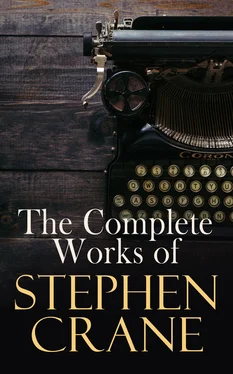He wandered aimlessly through the meal. She sat over behind the little blackened coffee-pot and gazed affectionately upon him.
After a time she began to grow agitated. Her worn fingers were gripped. It could be seen that a great thought was within her. She was about to venture something. She had arrived at a supreme moment. ‘George,’ she said suddenly, ‘come t’ prayer-meetin’ with me t’-night.’
The young man dropped his fork.
‘Say, you must be crazy!’ he said in amazement.
‘Yes, dear,’ she continued rapidly, in a small, pleading voice, ‘I’d like t’ have yeh go with me onct in a while. Yeh never go with me any more, dear, an’ I d like t’ have yeh go. Yeh ain’t been anywheres at all with me in th’ longest while.’
‘Well,’ he said—‘well; but what th’ blazes—’
‘Ah, come on!’ said the little old woman. She went to him, and put her arms about his neck. She began to coax him with caresses.
The young man grinned. ‘Thunderation!’ he said; ‘what would I do at a prayer-meetin’?’
The mother considered him to be consenting. She did a little antique caper.
Well, yeh can come an’ take care ‘a yer mother,’ she cried gleefully. ‘It’s such a long walk every Thursday night alone, an’ don’t yeh s’pose that when I have such a big, fine, strappin’ boy I want ‘im t’ beau me aroun’ some? Ah, I knew ye’d come!’
He smiled for a moment, indulgent of her humour. But presently his face turned a shade of discomfort. ‘But—’ he began, protesting.
‘Ah, come on!’ she continually repeated.
He began to be vexed. He frowned into the air. A vision came to him of dreary blackness arranged in solemn rows. A mere dream of it was depressing.
‘But—’ he said again. He was obliged to make great search for an argument. Finally he concluded: ‘But what th’ blazes would I do at prayer-meetin’?’
In his ears was the sound of a hymn, made by people who tilted their heads at a prescribed angle of devotion. It would be too apparent that they were all better than he. When he entered they would turn their heads and regard him with suspicion. This would be an enormous aggravation, since he was certain that he was as good as they.
‘Well, now, y’ see,’ he said, quite gently, ‘I don’t wanta go, an’ it wouldn’t do me no good t’ go if I didn’t wanta go.’
His mother’s face swiftly changed. She breathed a huge sigh, the counterpart of ones he had heard upon like occasions. She put a tiny black bonnet on her head, and wrapped her figure in an old shawl. She cast a martyr-like glance upon her son, and went mournfully away. She resembled a limited funeral procession.
The young man writhed under it to an extent. He kicked moodily at a table-leg. When the sound of her footfalls died away he felt distinctly relieved.
Table of Contents
That night, when Kelcey arrived at the little smiling saloon, he found his friend Jones standing before the bar engaged in a violent argument with a stout man.
‘Oh, well,’ this latter person was saying, ‘you can make a lot of noise, Charley, for a man that never says anything—let’s have a drink!’
Jones was waving his arms and delivering splintering blows upon some distant theories. The stout man chuckled fatly and winked at the bar-tender.
The orator ceased for a moment to say, ‘Gimme little whisky, John.’ At the same time he perceived young Kelcey. He sprang forward with a welcoming cry. ‘Hello, of man! didn’t much think ye’d come.’ He led him to the stout man.
‘Mr. Bleecker—my friend Mr. Kelcey!’
‘How d’yeh do?’
‘Mr. Kelcey, I’m happy to meet you, sir; have a drink.’
They drew up in line and waited. The busy hands of the bar-tender made glasses clink. Mr. Bleecker, in a very polite way, broke the waiting silence.
‘Never been here before, I believe, have you, Mr. Kelcey?’
The young man felt around for a highbred reply. ‘Er—no—I’ve never had that—er—pleasure,’ he said.
After a time the strained and wary courtesy of their manners wore away. It became evident to Bleecker that his importance slightly dazzled the young man. He grew warmer. Obviously, the youth was one whose powers of perception were developed. Directly, then, he launched forth into a tale of bygone days, when the world was better. He had known all the great men of that age. He reproduced his conversations with them. There were traces of pride and of mournfulness in his voice. He rejoiced at the glory of the world of dead spirits. He grieved at the youth and flippancy of the present one. He lived with his head in the clouds of the past, and he seemed obliged to talk of what he saw there.
Jones nudged Kelcey ecstatically in the ribs. ‘You’ve got th’ of man started in great shape,’ he whispered.
Kelcey was proud that the prominent character of the place talked at him, glancing into his eyes for appreciation of fine points.
Presently they left the bar, and going into a little rear room, took seats about a table. A gas-jet with a coloured globe shed a crimson radiance. The polished wood of walls and furniture gleamed with faint rose-coloured reflections. Upon the floor sawdust was thickly sprinkled.
Two other men presently came. By the time Bleecker had told three tales of the grand past, Kelcey was slightly acquainted with everybody.
He admired Bleecker immensely. He developed a brotherly feeling for the others, who were all gentle-spoken. He began to feel that he was passing the happiest evening of his life. His companions were so jovial and good-natured; and everything they did was marked by such courtesy.
For a time the two men who had come in late did not presume to address him directly. They would say: ‘Jones, won’t your friend have so and so, or so and so?’ And Bleecker would begin his orations: ‘Now, Mr. Kelcey, don’t you think—’
Presently he began to believe that he was a most remarkably fine fellow, who had at last found his place in a crowd of most remarkably fine fellows.
Jones occasionally breathed comments into his ear.
‘I tell yeh, Bleecker’s an ol’-timer. He was a husky guy in his day, yeh can bet. He was one ‘a th’ best known men in N’ York once. Yeh ought to hear him tell about—’
Kelcey listened intently. He was profoundly interested in these intimate tales of men who had gleamed in the rays of old suns.
‘That O’Connor’s a damn fine fellah,’ interjected Jones once, referring to one of the others; ‘he’s one ‘a th’ best fellahs I ever knowed. He’s always on th’ dead level, an’ he’s always jest th’ same as yeh see him now—good-natured an’ grinnin’.’
Kelcey nodded. He could well believe it.
When he offered to buy drinks there came a loud volley of protests. ‘No, no, Mr. Kelcey,’ cried Bleecker; ‘no, no. To-night you are our guest. Some other time—’
‘Here,’ said O’Connor; ‘it’s my turn now.’
He called and pounded for the bar-tender. He then sat with a coin in hand warily eyeing the others. He was ready to frustrate them if they offered to pay.
After a time Jones began to develop qualities of great eloquence and wit. His companions laughed. ‘It’s the whisky talking now,’ said Bleecker.
He grew earnest and impassioned; he delivered speeches on various subjects. His lectures were to him very imposing. The force of his words thrilled him. Sometimes he was overcome.
The others agreed with him in all things. Bleecker grew almost tender, and considerately placed words here and there for his use. As Jones became fiercely energetic the others became more docile in agreeing. They soothed him with friendly interjections.
Читать дальше












